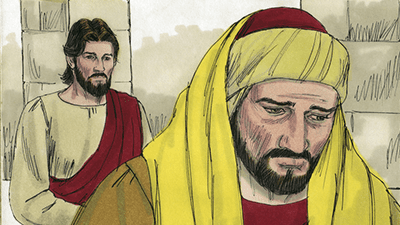By Fr. David Kiblinger, SJ

Jesus responds by telling the man he still needs to do a few things to get what he desires: sell what he has, give to the poor and become his follower. Instead of giving him a formula, Jesus calls him to a radically different relationship. A sense of apprehension immediately grips the man; this was asking too much of him. The more Jesus’ words rattle in his mind, the more discouraged he feels. He slumps his shoulders and turns away from Jesus, going back home saddened by the encounter.
The rich man’s experience in this story from Mark, Chapter 10, illustrates what in Jesuit circles is called desolation. According to St. Ignatius of Loyola, desolation, along with its opposite, consolation, make up the two fundamental types of inner movements we encounter in the spiritual life.
St. Ignatius believes a main challenge for us is to recognize when we are experiencing either one of these movements. In the Spiritual Exercises, he defines consolation and desolation and gives us a set of rules to guide us in identifying when we experience them, in explaining why we undergo them, and in responding to them when they occur. These rules have proven to be extremely fruitful in directing people toward greater love and service of God and others ever since they were articulated almost five centuries ago.
To grasp what St. Ignatius means by desolation, we need to keep in mind his view of our interior life. Our consciousness is a stream of what he terms interior motions. These are the thoughts, feelings and attractions that pop in and out of consciousness as we go through our days. Some linger, while others are there only momentarily.
St. Ignatius believes there are three sources of these interior motions. One source is our very selves. Our unique personalities and the things that happen to us give rise to many of our thoughts, feelings and attractions. But some of them come from sources outside of ourselves. Both the good spirit and its enemy, the evil spirit, can provoke interior motions in us, too. Thus, our conscious life is made up of thoughts, feelings and attractions coming from ourselves, from the good spirit and from the evil spirit. With his rules, St. Ignatius helps us distinguish which of these sources is at the root of our interior motions so that we can see where the motions are leading us.
Desolation refers to those interior motions produced in us by the evil spirit. Included under the umbrella of desolation are things like gloominess of soul, confusion, disquiet, distrust, tepidity and sadness (Spiritual Exercises [317]). These are tools that the evil spirit uses to accomplish his purpose of drawing us away from loving God and neighbor.
Not all experiences of sadness or confusion are from the evil spirit, though. Some moments of sadness or confusion are simply natural to our human experience. For example, the grief that comes from losing a loved one is typically not the evil spirit acting on the bereaved. The type of desolation St. Ignatius is concerned with is spiritual desolation, the origin of which is the evil spirit and whose end is violence and death.
Every Christian is sure to experience times of desolation in life. The enemy of human nature, as St. Ignatius calls the evil spirit (Spiritual Exercises [325]), tries to do everything in his power to make a Christian deviate from the path to God. And if he cannot make a Christian deviate completely, he at least tries to slow down progress toward God.
Desolation is a powerful tool, especially when a Christian starts to take the spiritual life seriously. Facing the prospect of picking up the cross of Christ and following Him, with all the difficulties and sacrifices entailed, a Christian may be struck with self-doubt and fear. If a Christian falls back into an old sin, then discouragement and sadness threaten. After many years of service to Christ, a Christian may experience weariness or feel like their efforts are not making a difference. The temptation from desolation is to relax the search for God or give it up completely.
The good news is that desolation cannot break us away from God by itself. It is not sinful, even though it tempts one to sin. St. Ignatius gives several strategies for dealing with desolation that a good spiritual director can explain. Most importantly, God never abandons us in times of desolation. The evil spirit inflicts it only because God allows him. Although we may be in desolation through our own fault and free choice, particularly when we neglect prayer and the sacraments, God also uses desolation as a means of spiritual training. God may test us to see how faithfully we persevere in the Christian life, especially when it is not easy. We may experience it to temper our own pride and comprehend interiorly our total reliance on God. It is a true grace when, by passing through desolation, our faith and hope in God are set on unshakeable foundations.
The rich man sought out Jesus because he wanted to live more faithfully and reach eternal life. When he heard what Jesus was asking him to do, he was thrust into desolation. The evil spirit threw up roadblocks to keep the man from deepening his life in Christ. We do not hear the end of the story, however. Can we hope that he eventually fought off the gloominess and despair and came back to follow Jesus? Jesus was surely waiting for him to return.
Father David Kiblinger, SJ, is an associate pastor at St. Martin de Porres Parish in Belize City, Belize.


